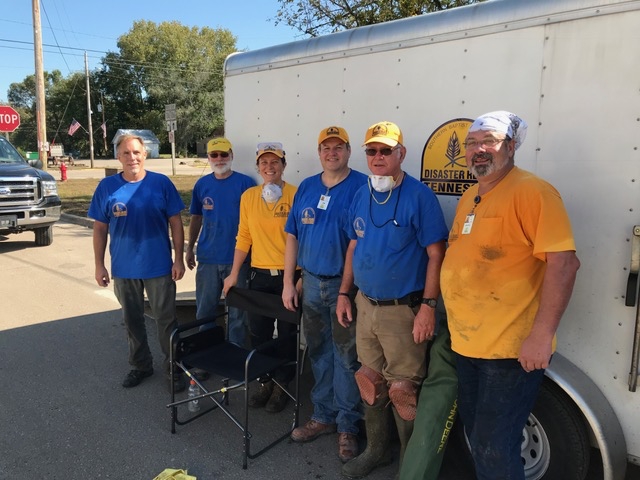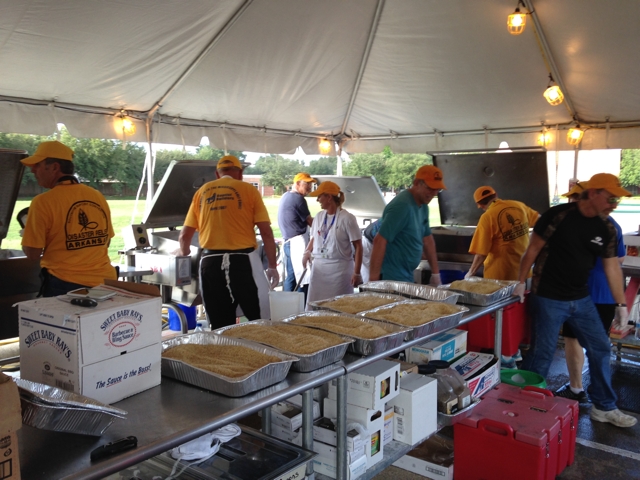Responding to Florence
Baptist Relief sends assistance
Volunteers from Second Baptist Church deployed to South Carolina on Saturday to aid the victims of Hurricane Florence.
The exact location is one even they didn’t know prior to leaving.
“We are taught early in our training to not just be flexible, but to be fluid,” said volunteer Mark Baldwin. “Things change often and rapidly.”
“Flexible” is too rigid.
Baldwin and the others traveling through Second Baptist are certified through Southern Baptist Disaster Relief. It costs $36 to get certified, and that includes a background check.
“You need to be credentialed so you can go into these areas,” said Baldwin, “so people know you’re not there to loot or for a false reason.”
Each volunteer is issued a badge. Different crews are trained in different areas. Baldwin, who retired from ORNL and the U.S. Navy, is on the mass feeding team, and a chainsaw team will head out from Second Baptist on Oct. 6.
All volunteers pay their own expenses and usually sleep on cots in church facilities, according to Baldwin.
Why do they do it?
“We serve in the power of and for the glory of our Lord and saviour Jesus Christ,” he said.
Volunteer Danny Hatfield shares that sentiment and more.
“We’re supposed to help each other,” he said, “and that’s why I do it.”
Hatfield has volunteered in disaster relief for eight years and has been deployed at least six times. More, if you count locally.
He volunteered on the chainsaw crew in Connecticut after tornadoes came through in June. Those were long, hard days, according to Hatfield.
“But very rewarding,” he added.
Their days usually start at 7 a.m., when they receive their work orders.
“Then we head out until the end of the day or until the job’s complete,” he said. “We get our chainsaws out and find a starting point.”
Hatfield has been retired for eight years.
“I just enjoy helping other people, doing what God wants me to do,” he said, “and I feel like this is how he can have me doing good work for him. As long as he permits me to do it, I do it.”
Most of the volunteers are retired, which is sometimes a challenge. Baldwin used to work the chainsaws, but found the heat more than he could handle after a few years. They need younger volunteers, but work schedules and costs can be a major obstacle.
“I retired four or five years ago, so I have more time to deploy,” Baldwin said.
Disaster relief goes on for months — if not years — according to Baldwin, so there is still plenty of time to get certified now and serve the victims of Florence.
“There’s a team there already,” he said, “and they served their first meal yesterday [Sept. 17].”
The teams will cook for tens of thousands of people, according to Baldwin. One cooking unit can make up to 35,000 meals per day. The teams bring tractor trailers loaded down with cooking equipment, including pallets full of ovens and cooking supplies.
The Red Cross then takes the food and delivers it to either individual neighborhoods — like an ice cream truck, according to Baldwin — or shelters.
He remembers deploying to Flint, Michigan, during the water crisis.
“We took box trucks full of water and water filters so people could come get water,” he said. “Many of those people didn’t have much, but they were very grateful. It starts putting life in perspective when people realize things are just things.”
Ed Hooks is the director of volunteer ministries at Second Baptist. He coordinates with the state director of Southern Baptist Disaster Relief when assistance is needed. His first deployment was to Louisiana when Hurricane Katrina hit. He’s been active ever since. Members of his church have volunteered during nearly every major hurricane.
He said that the nation has gone around five years without a major storm, and so most people will need to recertify to be able to volunteer. Often, when there is a lull, people don’t get certified, which has led to a decrease in volunteers.
“Then when something hits, you scramble for certified people,” he said. “It’s hard getting qualified people or volunteers willing to deploy.”
To find the nearest training programs available, visit tndisasterrelief.org.



